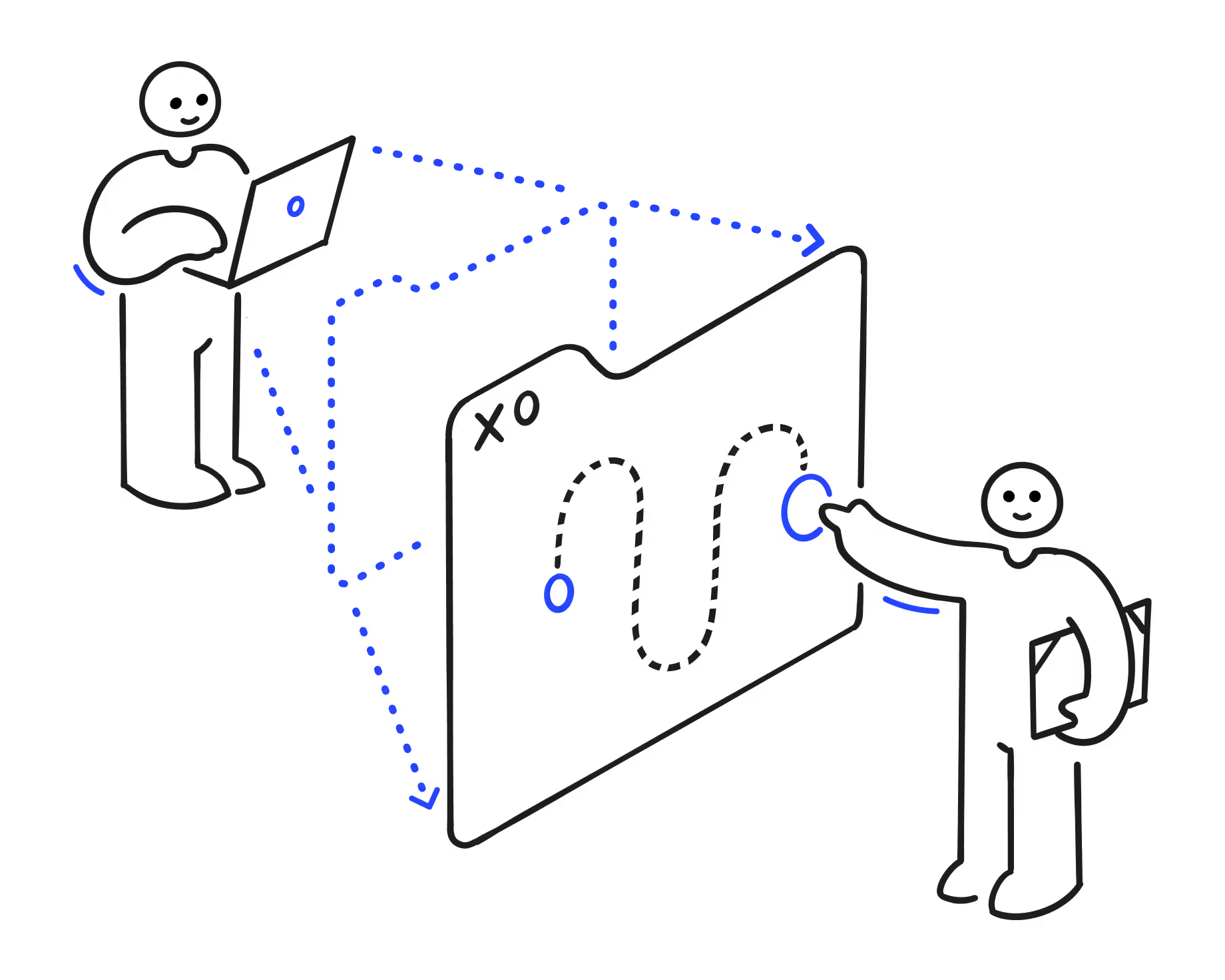8 engaging ideas for team-building at work

Discover Workleap Officevibe's benchmark report on 12 key employee engagement metrics

Behind every high-performing team is a foundation of trust. And team-building activities are one of the simplest ways to forge that foundation. Whether your team is remote, in-person, or somewhere in between, meaningful interaction leads to higher engagement and a healthier culture.
But not all activities hit the mark. Some are awkward, while others feel forced (or just forgettable). The key is choosing the right format, timing, and tone for your unique group.
This guide shares 8 worthwhile ideas for team building at work, plus tips to make your activities memorable.
Why team-bonding exercises are a workplace essential
A good team bonding exercise isn’t a one-and-done event. When team building becomes part of your routine, it helps everyone feel more connected and makes the everyday work experience more enjoyable.
Improving communication
When people get together in relaxed settings, it’s easier to talk, listen, and really understand one another. Casual moments take the pressure off, making it more natural to share thoughts and speak openly.
Boosting trust
Trust builds over time, often through small shared experiences. Whether it’s solving a puzzle or simply sharing a laugh, these moments create a sense of safety and support. Employees who feel heard are more likely to rely on each other and collaborate confidently.
Increasing engagement
Work feels better when you enjoy the people around you. Regular team time lifts morale and makes work feel less like a chore and more like a shared journey. That sense of belonging reminds people that their presence matters.
Enhancing skill development
Team-building activities can uncover hidden strengths and spark new ideas. Low-pressure challenges give everyone a chance to try something new and recognize each other’s talents in unexpected ways.
Building a stronger workplace culture
Regular team bonding builds a warmer, more inclusive culture. It gives people space to connect, share ideas, and enjoy being together. These moments create a sense of belonging that sticks, especially during times of change or when new teammates join.
8 fun ideas for team building for every goal and group
Every team works a little differently, so it helps to have a mix of fun team-building ideas ready to go. Depending on the moment, you might want something quick to warm up the group. Other times, an activity that sparks connection, creativity, or a shared challenge could be what you need. Here are 8 options that work across different moods, group sizes, and settings.
Icebreakers and getting-to-know-you activities
These are quick, easy ways to help people feel more at ease, especially if they’re new or haven’t spent much time with the team. The activities are simple to run and work well whether you’re in person, remote, or somewhere in between.
1. Icebreaker questions
Light questions like “What’s your go-to coffee order?” or “What’s something small that made you smile this week?” can get people talking. If you want to go a little deeper, try connection prompts that explore values or working styles.
- Purpose: Warm up the room and inspire conversation
- Group size: Any
- Time: 5–10 minutes
- Best for: Kicking off workshops or virtual meetings
2. Two truths and a lie
Everyone takes turns sharing two true things and one made-up “fact,” then the group tries to guess which is which. It’s a lighthearted activity that works with just about any group, and you can even add a theme like travel or childhood to mix things up.
- Purpose: Encourage teammates to share personal facts
- Group size: Small to medium
- Time: 10–15 minutes
- Best for: Team meetings, onboarding, or retreats
These quick exchanges build comfort and connection. They’re especially helpful for welcoming new teammates or bringing people back together after a break.
Problem-solving and teamwork challenges
If promoting collaboration is your goal, these activities are a strong place to start. They encourage employees to think through problems as a team and lean on each other’s strengths. The focus isn’t on winning but on working together, building trust, and learning to navigate challenges collaboratively.
3. Escape room
Teams work through a series of clues to solve a mystery or complete a mission. Depending on the team's distribution, the escape room can be in person or online. Either way, it’s a fun way to see how people support each other under pressure.
Escape rooms also make a great team-building activity for small groups, and they can reveal interesting team dynamics. You’ll notice who jumps in first, who keeps things on track, and how decisions get made on the fly.
- Purpose: Strengthen problem-solving and teamwork
- Group size: Small groups of 4–6
- Time: 30–90 minutes
- Best for: In-person or virtual team-building events
4. Scavenger hunt
Give teams a list of items or tasks, then send them off to find or complete them. You can set up this team development exercise in the office, outdoors, or even online. It’s a flexible game that can be as silly or thoughtful as you want.
- Purpose: Build collaboration and friendly competition
- Group size: Any, split into smaller teams
- Time: 30–60 minutes
- Best for: Outdoor or office-wide team building
5. Office trivia
Create a mix of fun questions about your team, your company, or random topics unrelated to work. You can use a trivia tool like Kahoot! or read questions aloud and let people shout out answers.
Trivia is a great way to spark laughs and help people learn more about each other. It’s also great for helping newer teammates feel included, since it lets them catch up on the fun facts others may already know.
- Purpose: Spark friendly interaction and shared knowledge
- Group size: Any
- Time: 15–30 minutes
- Best for: Remote or hybrid meetings
Creative and strategic thinking exercises
These skill-building activities give your team space to experiment, express themselves, and try something new together.
6. Puzzle challenge
Split into small groups and give each team a puzzle to solve. You can use a jigsaw, a logic problem, or a digital riddle. Keep it low-key or add a competitive twist, depending on your team’s vibe.
- Purpose: Encourage collaboration through creative problem solving
- Group size: Small teams of 3–6
- Time: 30–60 minutes
- Best for: In-person team sessions
7. Build-a-story
Start with one sentence, then have each group member add a line. These stories often take unexpected turns, which is part of the fun. Even better? There’s no prep required.
- Purpose: Develop communication and creativity
- Group size: 3–10
- Time: 15–20 minutes
- Best for: Workshops or brainstorming sessions
8. Product pitch
Have each group invent a product or service and pitch it to the team. This skill-building activity helps boost creativity, communication, and confidence. The team’s pitches might even spark some real ideas your company can build on.
- Purpose: Practice presentation and innovation skills
- Group size: 4–6
- Time: 30–45 minutes
- Best for: Team offsites or innovation-focused days
Tips for making every team development exercise count
Facilitating team development doesn’t require a big budget or a perfect plan. A few small shifts in how you choose and facilitate activities can make your next team activity more meaningful for everyone.
Set a clear purpose
Are you trying to build trust, spark creativity, or help people connect? Choose an activity that fits the moment and let your team know why it matters. When people understand the “why,” they’re more likely to engage.
Make it inclusive
Not everyone relishes the spotlight. Offer options that let people participate in the ways that make them most comfortable, whether it’s speaking up, observing, or sharing their thoughts in writing.
Keep it consistent
We’ve already said this, but it’s worth repeating: Team building works best as a habit, not a one-off event. Add small rituals to your routine, like check-ins or regular shoutouts. These ongoing moments build stronger connections over time.
Ask for feedback
Check in after the activity to see what worked and what didn’t. Tools like Workleap Officevibe’s pulse surveys make it easy to track engagement and fine-tune your approach.
Make it relevant
Choose activities that reflect the challenges your team is navigating right now. Even quick moments of connection can have a big impact, especially when paired with efforts to build trust and stay aligned.
Build stronger teams with Workleap Officevibe
When team building is woven into your company culture, connection and collaboration become second nature. Workleap Officevibe helps you get that rhythm going, turning everyday moments into meaningful engagement.
From peer-to-peer recognition with Good Vibes to alignment tools like goal setting, 1:1 check-ins, and Pulse Surveys, Officevibe helps you create an environment where trust grows, communication flows, and teams move forward together.
Book a demo to see how Workleap Officevibe drives team engagement that lasts.
Workleap is making work simpler, kinder, and faster.





.avif)






